Headlines
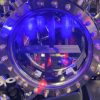 In a groundbreaking study, researchers at JILA have demonstrated continuous lasing and strong atom-cavity coupling using laser-cooled strontium atoms. This innovative experiment opens new avenues for precision measurement, promising advancements in quantum sensing and metrology.
In a groundbreaking study, researchers at JILA have demonstrated continuous lasing and strong atom-cavity coupling using laser-cooled strontium atoms. This innovative experiment opens new avenues for precision measurement, promising advancements in quantum sensing and metrology.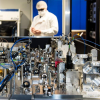 Infleqtion’s star continues to rise as Colorado’s quantum hub grows. The company of firsts, spun out of CU Boulder as ColdQuanta, seems to be everywhere these days, including outer space.
Infleqtion’s star continues to rise as Colorado’s quantum hub grows. The company of firsts, spun out of CU Boulder as ColdQuanta, seems to be everywhere these days, including outer space. The Colorado Quantum Incubator (COQI)—a CU Boulder-led hub for advancing quantum research, innovation and community engagement—is ramping up operations as it welcomes its first companies, including inaugural tenant Quantum Rings.
The Colorado Quantum Incubator (COQI)—a CU Boulder-led hub for advancing quantum research, innovation and community engagement—is ramping up operations as it welcomes its first companies, including inaugural tenant Quantum Rings. Entrepreneur Eva Yao is working to commercialize quantum technology from the lab of Jun Ye (Physics) that can rapidly detect very small molecules in human breath, potentially enabling early disease detection and improved patient outcomes.
Entrepreneur Eva Yao is working to commercialize quantum technology from the lab of Jun Ye (Physics) that can rapidly detect very small molecules in human breath, potentially enabling early disease detection and improved patient outcomes.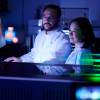 AB Nexus awarded four research teams from the CU Anschutz Medical Campus and CU Boulder. Collectively, the winning teams will receive $750,000 in funding to advance cutting-edge research that improves human health and well-being.
AB Nexus awarded four research teams from the CU Anschutz Medical Campus and CU Boulder. Collectively, the winning teams will receive $750,000 in funding to advance cutting-edge research that improves human health and well-being. In a new theoretical study to be published in PRX Quantum, physicists at JILA have proposed a way to make the most precise clocks in the world even more robust—by weaving in the strange, protective properties of topological physics.
In a new theoretical study to be published in PRX Quantum, physicists at JILA have proposed a way to make the most precise clocks in the world even more robust—by weaving in the strange, protective properties of topological physics.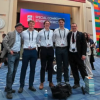 The Special Competitive Studies Project (SCSP) exposes students to applications of AI, quantum sciences, and a rich network of industry, national labs and government sector leaders.
The Special Competitive Studies Project (SCSP) exposes students to applications of AI, quantum sciences, and a rich network of industry, national labs and government sector leaders.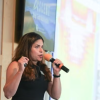 AtomThermCAD uses AI-accelerated quantum physics calculations to model semiconductors at an atomic level so it can accurately predict whether components too small to be seen by the naked eye will overheat.
AtomThermCAD uses AI-accelerated quantum physics calculations to model semiconductors at an atomic level so it can accurately predict whether components too small to be seen by the naked eye will overheat. The first Bose-Einstein Condensate was first created by Eric Cornell, Carl Wieman, Mike Anderson, Jason Ensher and Michael Matthews on June 5, 1995 in JILA at CU Boulder.
The first Bose-Einstein Condensate was first created by Eric Cornell, Carl Wieman, Mike Anderson, Jason Ensher and Michael Matthews on June 5, 1995 in JILA at CU Boulder. Massimo Ruzzene, CU Boulder's senior vice chancellor for research and innovation, explains how federal funding cuts have impacted university research, including quantum innovation opportunities.
Massimo Ruzzene, CU Boulder's senior vice chancellor for research and innovation, explains how federal funding cuts have impacted university research, including quantum innovation opportunities.

